

What happened in Philippi? Why did the city seemingly disregard its own studies and forge ahead to gamble with a critical food and water resource during a disaster-level drought event? Is it a tight-knit network of powerful individuals that stand to benefit? Legislation that’s too easy to find loopholes in? A systemic failure? Or a perfect storm? Regardless, toward Day Zero and beyond, it’s the citizens who will have to adapt and struggle to survive.
We don’t fully know what the New Normal will look like. What we do know is that the population of at least 26 African countries is set to double by 2050. We know the climate – whether naturally or unnaturally – will change. And we know we should expect the unexpected. Which means we’ll need to rethink, drastically, how we manage our cities, our farms, and our resources.
According to a 2017 fact sheet on drought and agriculture in the Western Cape, winter cereal production in 2017 showed decreases of 32% (wheat), 21% (barley) and 4% (canola). The production of stone fruit was estimated to have decreased in one season by 9-20%, while table grape production decreased by 7-13%.
As the Cape lurches towards Day Zero, farmers are facing severe water shortages. Their allocations have run out and they are now dependent on their own water supply for as long as it lasts. Those in the Philippi Horticultural Area say it’s unthinkable to sacrifice any farmland – or potential farmland – that lies over sustainable groundwater. Particularly when many of those farms supply affordable food to local businesses.
As to resource allocation, analysts Daily Maverick Chronicle spoke to say inclusivity will become an increasingly important – and difficult – conversation.
Philippi illustrates, on a micro level, Cape Town and South Africa’s failures to keep up with rapid change and expansion in an unpredictable environment, in the aftermath of apartheid. Those failures can take many forms: some unintentional, some willful.
It also illustrates the struggle to balance competing needs in a rapidly developing environment, and the potential for systemic and individual failure where this is not achieved. And it illustrates the challenge of doing so inclusively.
Where does this leave Philippi? According to Professor Edgar Pieterse, director of the African Centre for Cities at the University of Cape Town, it’s a casualty of an outdated system that left room for damage.
A more integrated approach – the kind he’s advocating for service delivery across the board – would have prevented unnecessary suffering. Thinking of Philippi in terms of its overlapping zones would have been helpful: the agricultural zone, Marikana adjacent to it, the industrial zone linking it to the airport. “If you think in terms of a regional plan you will come up with a very different solution,” says Pieterse. “Both absolute protection, and advocating for real estate, are profoundly flawed visions,” he argues. “And in a way, I blame the city – they have not done the planning at the right scale. There is a larger political failure.”
This, says head of the Standing Committee on Economic Opportunities, Tourism, and Agriculture in the provincial legislature, Beverley Schafer, is what the committee is hoping to achieve. In August, the committee announced the DA in the Western Cape would push for the development of Philippi into a “dedicated, integrated, and self-sustaining agri-park to capitalise on the immense agricultural and job-creating potential of the region”.
“We have previously called for the Philippi Horticultural Area (PHA) to be classified as an Agricultural Development Zone (ADZ) to protect the long-term farming potential of the land,” she said. “Pursuant to a presentation by the Philippi Economic Development Initiative (PEDI) at the Western Cape Provincial Parliament today, it was revealed that Philippi is earmarked to be a leading agricultural hub in the Province bringing in some R8,1-billion in revenue for the City of Cape Town, and creating 112,000 jobs in the Metro.”
Schafer said at the time that she had written to Mayor Patricia De Lille recommending the city await the results of that aforementioned impact study by Indego into the agricultural footprint and viability of the PHA before any decisions were taken for its future development. Whether Schafer’s recommendation will carry more weight than those of her predecessors remains to be seen – especially given the uncertainty of the City’s own leadership.
Similarly, in response to a question at a recent media briefing, Deputy Mayor Ian Neilson said it was “only a personal opinion because we have not debated this in the City”, but that in light of the scarcity of water, “I do think we need to review our approach… [and protect the PHA].”
Schafer’s researcher, Ryan Smith, told Chronicle: “We want to support the PHA’s future, not only as the breadbasket of the Western Cape, but as a key agricultural contributor to job creation in the province and the agri-processing sector at large.
“The PHA is a uniquely fertile site and has the potential to serve as a hotspot for agricultural training, skills development, and high-yield intensive agriculture for the Western Cape and South Africa at large. Furthermore, following an NCOP oversight visit yesterday to the Western Cape, the provincial department of agriculture reiterated its commitment to preserving the PHA as the bread basket of the Western Cape. We foresee Philippi’s future squarely in agriculture.”
But, he added, the committee could not reverse decisions already taken by the city. And so, once again, the residents wait.
Water experts, including Morris, have noted that it’s not impossible to recharge an aquifer in developed areas, and that some environmentally sensitive development is not impossible. The PHA Campaign, too, has acknowledged this. The issue, however, is the broader picture: first, not rushing development without adequate assessment and steps to mitigate environmental impact and second, securing the future of agricultural land that, according to a report to the Planning Committee in 2012, is “irreplaceable within 120km of Cape Town”.
Third, according to a report by Umvoto, looking into the best possible use of the area. The report identified the PHA as the highest-potential area for bio-remediation of the Cape Flats Aquifer, if the City of Cape Town were to diversify its water supply and hope to obtain clean water from the CFA. During a one-in-a-thousand-year drought event, this is a point worth noting.
But however local politics evolves, De Lille has been right about one thing: the urgent need for housing is not going away soon. This means the New Normal will involve thinking about integrating human and environmental needs very differently – a complex question in context of potentially declaring the whole of Cape Town a restructuring zone.
This is where the future of inclusivity starts to look a little different. Coleman argues there is little use easing processes for development at the expense of food and water security. The property bubble, she says, will burst if resources dry up. “The current lack of densification incentives means developers are building on increasingly expensive land with narrower margins,” she points out. “Eventually there will be no market for this. PHA-style developments will not sell.”
“We need to start designing and living in our cities in a different way,” says Dr Kirsty Carden, of UCT’s Urban Water Management Research Unit. Where water is concerned, this means multi-functional green infrastructure that allows infiltration of rain; the later extraction of storm water. Ways to build water storage and catchers, and flood alleviation in urban spaces. Most importantly, resilience.
Resilience was, in fact, on the city’s radar with the hiring of its first Chief Resilience Officer, Craig Kesson. But the devastating fall-out between him and De Lille saw him turn whistle-blower and the Mayor facing disciplinary processes.
“We don’t know the impact of climate change,” says Carden. “We’re not quite sure in terms of figures and dryness and the types of rain cycles we get. But Cape Town is set to grow over the next 20 years and there are limited options for surface storage. So whether we have another drought or not, we will have shortages of water over the next 20 years.”
That’s just water. In reality, says Pieterse, water insecurity is just one symptom of a system in its death throes, and a complete overhaul is required. This will start with legislation. And after legislation, political will. Implementation is the real challenge.
The Spatial Development Framework, he points out, has long recognised the need to reform planning guidelines across Cape Town. Political will is something different. “The burning platform just wasn’t there,” he told Daily Maverick Chronicle. “The current crisis represents for the first time a profound enough set of challenges that doesn’t represent any easy policy or technical answers – it just doesn’t exist. It requires more profound consideration.” In other words, the water shortage, alongside increasing public pressure for well-located social housing, may be a very necessary wake-up call. The question is whether it’s too late.
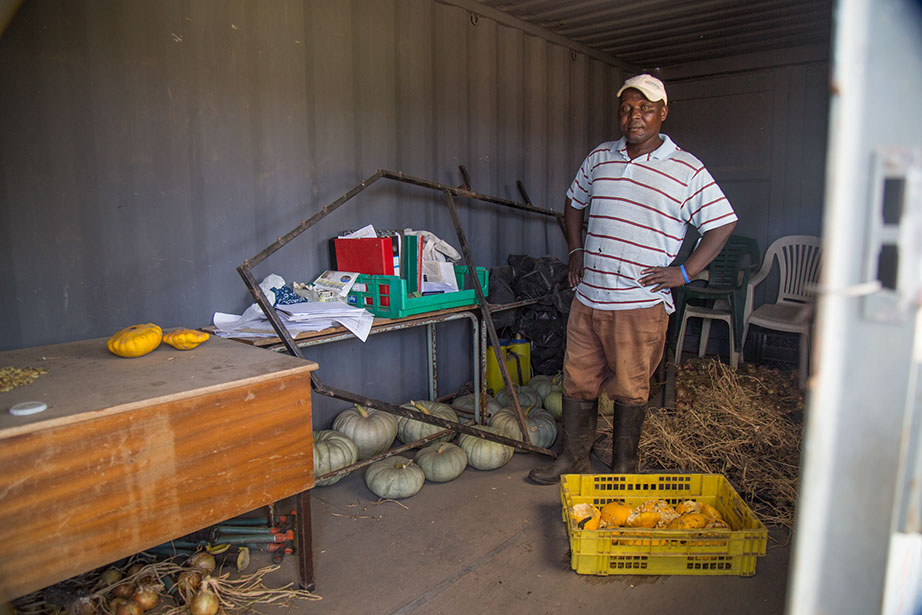
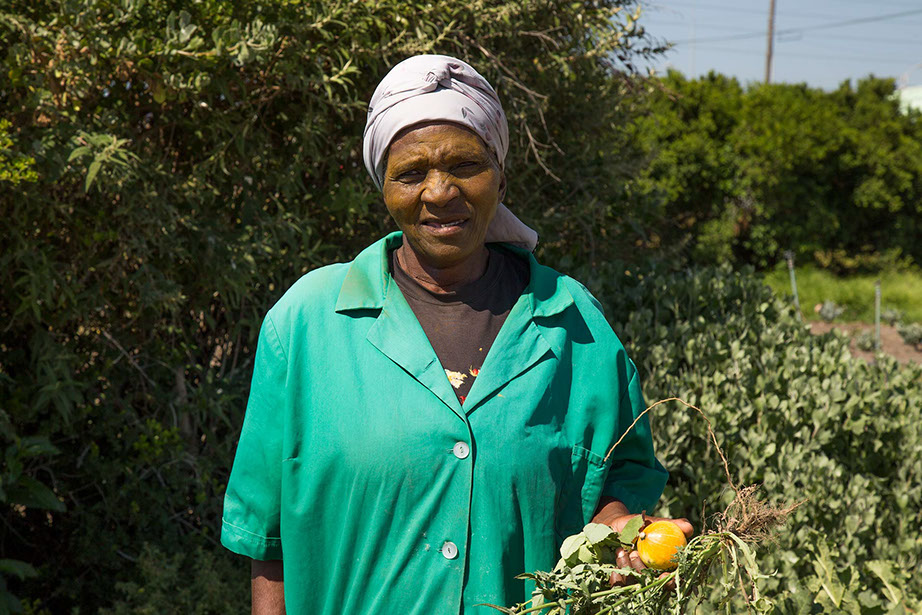
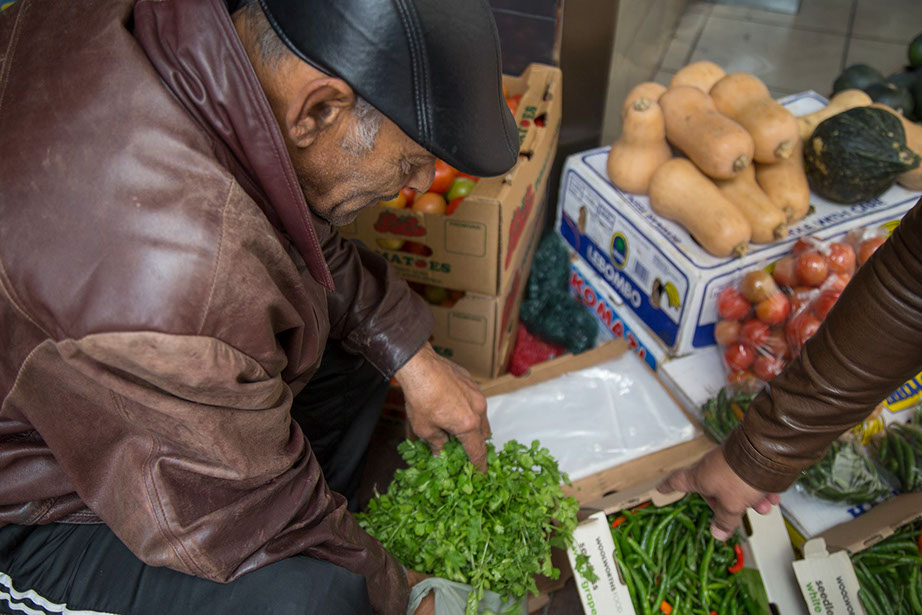
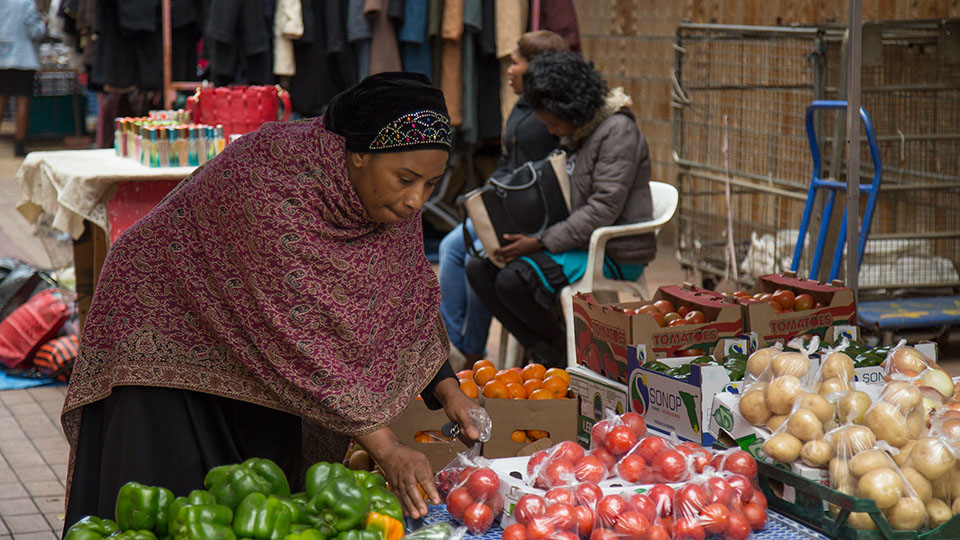
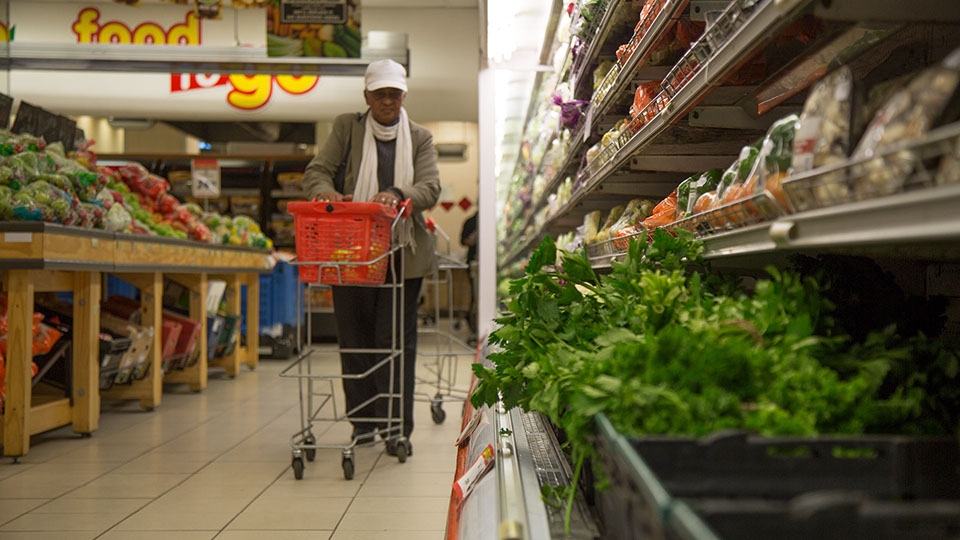
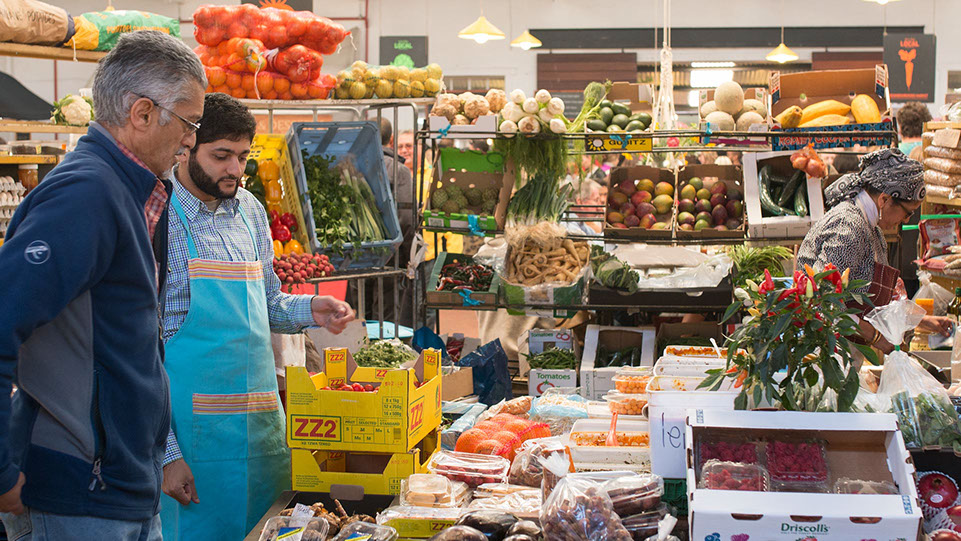
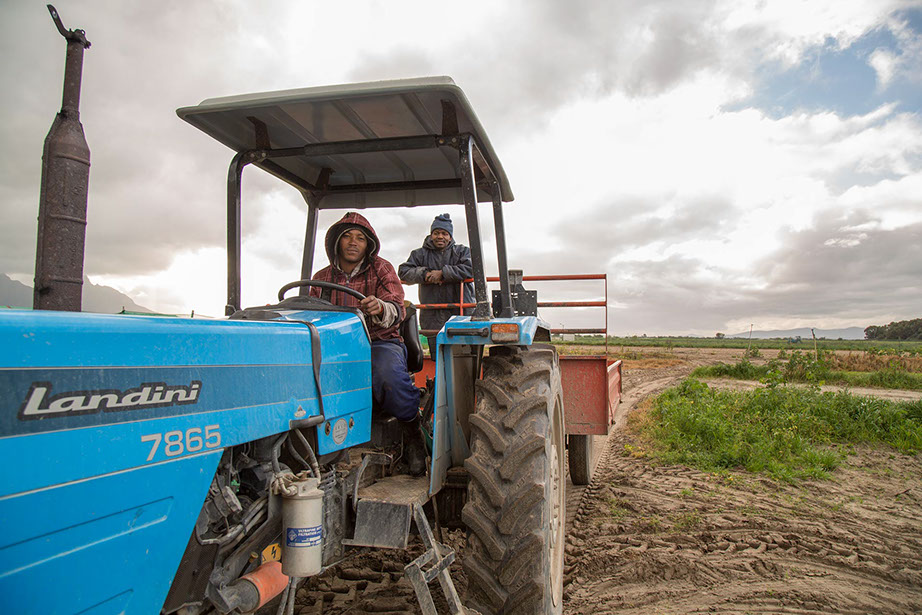
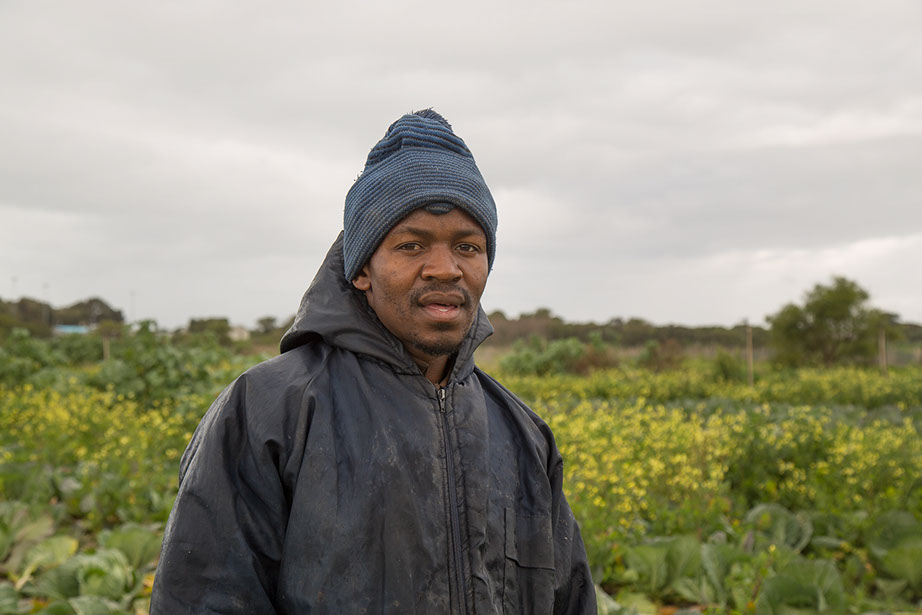
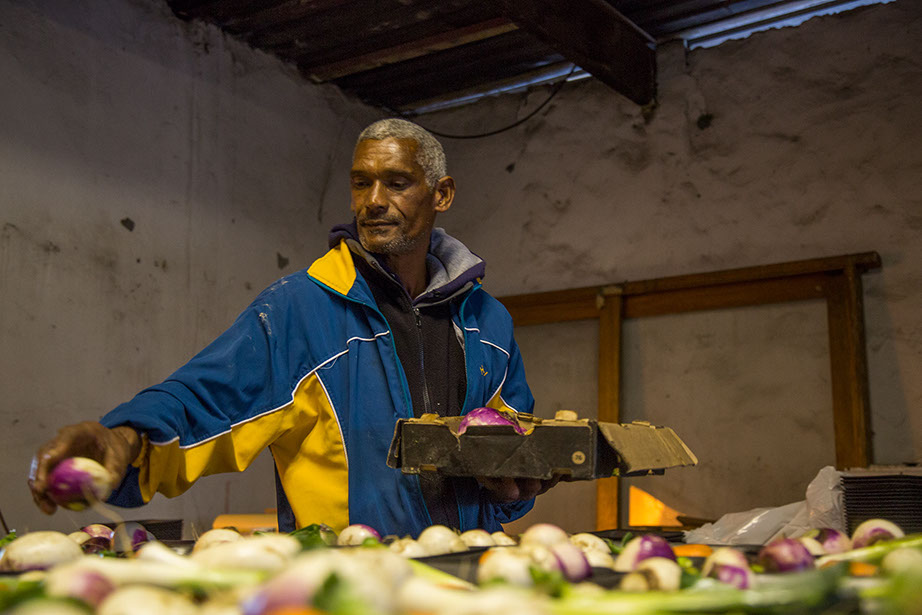
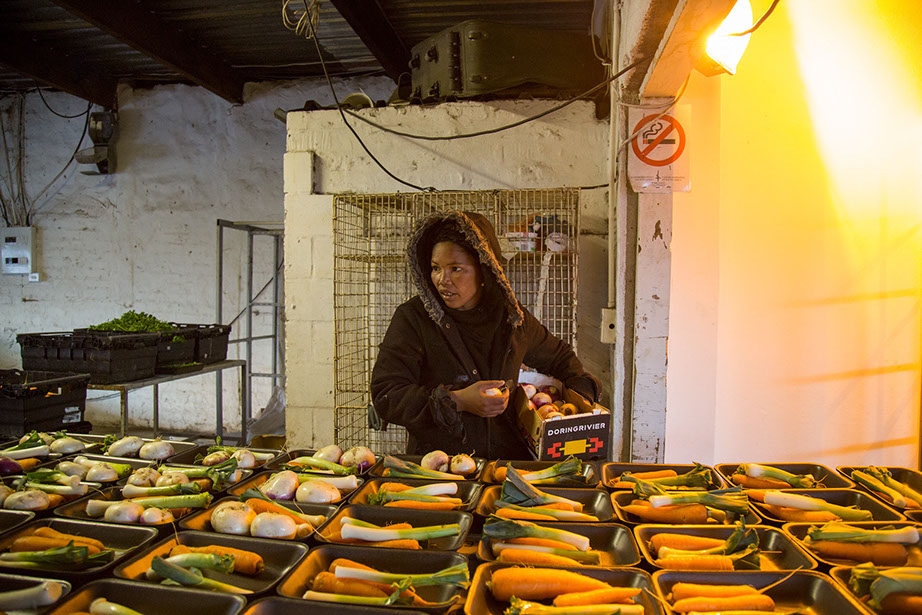
>
Local PHA farmers grow a significant proportion of the food sold at stalls, markets and grocery stores throughout Cape Town.

The PHA provides much-needed jobs for the agricultural sector. Photo by Sumeya Gasa .

"The Resistance is Fertile" reads a protester's campaign slogan during a protest in Cape Town.
starting point. (“We have to radically rethink the functioning of the city – what we consider acceptable space and forms of living.”) And third, reforming development legislation. The goal is twofold: facilitating development, but also ensuring there’s no development free-for-all. This is the norm elsewhere in the world, he argues – South Africa no longer has the luxury of allowing developers to profit at the expense of communities.
The problem: in the Western Cape at least, he believes this is likely to be met with resistance. Implementing these changes will require, in short, local leadership, and the country’s largest opposition party, to take on its constituents. “The DA will have to do what it finds politically unviable,” Pieterse says. “With the current disputes within the DA, the fault lines that have been drawn, whether they have the wherewithal to do that is completely unclear.”
In recent months, the City of Cape Town has indicated a shift
towards more inclusive planning. Councillor Brett Herron has
been at the forefront of this campaign, saying: “Building
inclusive communities through reversing the spatial legacy
of apartheid is a key priority of this government. South African
cities should break with the past where our urban form is
defined by poorer families living on the fringes.” After lengthy
wrangles between the city and housing activists, Herron confirmed the city would begin with affordable housing opportunities on well-located city-owned land.
“The importance of this occasion cannot be overstated. Developing prime land for lower-income residents in Cape Town is a momentous occasion,” Herron said.
Whether the city will follow through beyond the developments it has announced to date remains to be seen. And building, after all, requires water.
For Philippi, the future may depend on how the chips fall within local government. Meanwhile the PHA, with its activists awaiting their court date, remains in limbo, in theory protected by the committee, but in practice still beholden to decisions already taken by the city. Which in turn remains beholden to systems and forces not alive to the rapid changes around them.
And Cape Town’s struggle is located within a much larger context. For Pieterse, the acceleration of climate change at the precise moment African cities are expected to double their urban population represents – in layman’s terms – a particularly worrying time to be alive. Or, as he puts it, a dramatic expansion of dysfunction. “It is the introduction of a profound level of uncertainty none of our modern institutions are geared for,” he explains. “Our nation state was shaped after World War ll, and as large bureaucracies do, has consolidated a sense of self as the only way society can be organised. It is caught in the hubris of that. Taking a long-term institutional perspective, there is just no way we were going to be ready for this.”
Are we going to be ready for more of the same in the years ahead, then? In a word, no. “The big governance transition that will have to happen in the next 10 to 15 years is an acceptance of citizen engagement and analytics. Political scientists and public policy experts don’t know yet what that will look like. We are on the cusp – in the decline of the bureaucratic state and all that represents, and the emergence of something as yet unknown, in the context of heightened crisis, multiple crises. The state is caught in the headlights.” And, Pieterse says, there’s a much greater risk for corruption and irregularities.
The only way out will be to engage better with the public and tap into the vast knowledge available among citizens, he argues; something local leaders have not managed to date, and a failure not unique to them. In Cape Town’s case, the city did, he believes, eventually “throw everything in the sink” to try to solve the water crisis. The trouble is that for myriad reasons, it came too late. And, if rushed development decisions do jeopardise the CFA and local agriculture, the damage will be irreversible.
The only real question, then, during this crucial time, is how desperate citizens’ situation must become before the overhauls begin. It’s a question we can’t yet answer. DM

ieterse argues for three main changes: one, densification. (“The city will have to put a moratorium on all new public housing at the edges of townships.”) Two, behaviour change, driven by tariff increases as a

A farmer in the PHA and his wife point out the areas that will be developed over the green lung in the coming years. Photo by Diana Neille .
South Africa no longer has the luxury of allowing developers to profit at the expense of communities.
By Marelise van der Merwe & Heidi Swart
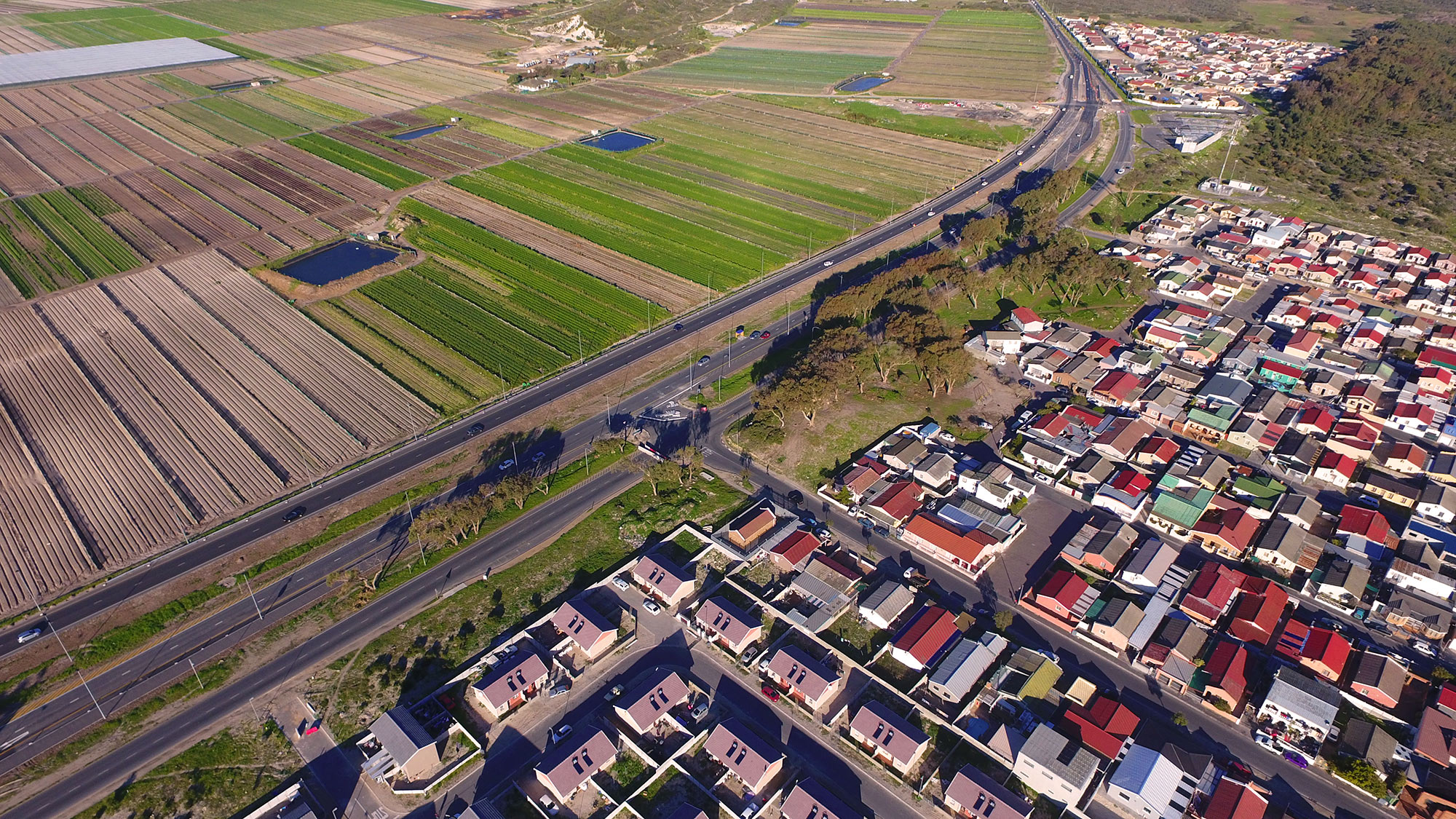


What happened in Philippi? Why did the city seemingly disregard its own studies and forge ahead to gamble with a critical food and water resource during a disaster-level drought event? Is it a tight-knit network of powerful individuals that stand to benefit? Legislation that’s too easy to find loopholes in? A systemic failure? Or a perfect storm? Regardless, toward Day Zero and beyond, it’s the citizens who will have to adapt and struggle to survive.
We don’t fully know what the New Normal will look like. What we do know is that the population of at least 26 African countries is set to double by 2050. We know the climate – whether naturally or unnaturally – will change. And we know we should expect the unexpected. Which means we’ll need to rethink, drastically, how we manage our cities, our farms, and our resources.
According to a 2017 fact sheet on drought and agriculture in the Western Cape, winter cereal production in 2017 showed decreases of 32% (wheat), 21% (barley) and 4% (canola). The production of stone fruit was estimated to have decreased in one season by 9-20%, while table grape production decreased by 7-13%.
As the Cape lurches towards Day Zero, farmers are facing severe water shortages. Their allocations have run out and they are now dependent on their own water supply for as long as it lasts. Those in the Philippi Horticultural Area say it’s unthinkable to sacrifice any farmland – or potential farmland – that lies over sustainable groundwater. Particularly when many of those farms supply affordable food to local businesses.
As to resource allocation, analysts Daily Maverick Chronicle spoke to say inclusivity will become an increasingly important – and difficult – conversation.
Philippi illustrates, on a micro level, Cape Town and South Africa’s failures to keep up with rapid change and expansion in an unpredictable environment, in the aftermath of apartheid. Those failures can take many forms: some unintentional, some willful.
It also illustrates the struggle to balance competing needs in a rapidly developing environment, and the potential for systemic and individual failure where this is not achieved. And it illustrates the challenge of doing so inclusively.
Where does this leave Philippi? According to Professor Edgar Pieterse, director of the African Centre for Cities at the University of Cape Town, it’s a casualty of an outdated system that left room for damage.
A more integrated approach – the kind he’s advocating for service delivery across the board – would have prevented unnecessary suffering. Thinking of Philippi in terms of its overlapping zones would have been helpful: the agricultural zone, Marikana adjacent to it, the industrial zone linking it to the airport. “If you think in terms of a regional plan you will come up with a very different solution,” says Pieterse. “Both absolute protection, and advocating for real estate, are profoundly flawed visions,” he argues. “And in a way, I blame the city – they have not done the planning at the right scale. There is a larger political failure.”
This, says head of the Standing Committee on Economic Opportunities, Tourism, and Agriculture in the provincial legislature, Beverley Schafer, is what the committee is hoping to achieve. In August, the committee announced the DA in the Western Cape would push for the development of Philippi into a “dedicated, integrated, and self-sustaining agri-park to capitalise on the immense agricultural and job-creating potential of the region”.
“We have previously called for the Philippi Horticultural Area (PHA) to be classified as an Agricultural Development Zone (ADZ) to protect the long-term farming potential of the land,” she said. “Pursuant to a presentation by the Philippi Economic Development Initiative (PEDI) at the Western Cape Provincial Parliament today, it was revealed that Philippi is earmarked to be a leading agricultural hub in the Province bringing in some R8,1-billion in revenue for the City of Cape Town, and creating 112,000 jobs in the Metro.”
Schafer said at the time that she had written to Mayor Patricia De Lille recommending the city await the results of that aforementioned impact study by Indego into the agricultural footprint and viability of the PHA before any decisions were taken for its future development. Whether Schafer’s recommendation will carry more weight than those of her predecessors remains to be seen – especially given the uncertainty of the City’s own leadership.
Similarly, in response to a question at a recent media briefing, Deputy Mayor Ian Neilson said it was “only a personal opinion because we have not debated this in the City”, but that in light of the scarcity of water, “I do think we need to review our approach… [and protect the PHA].”
Schafer’s researcher, Ryan Smith, told Chronicle: “We want to support the PHA’s future, not only as the breadbasket of the Western Cape, but as a key agricultural contributor to job creation in the province and the agri-processing sector at large.
“The PHA is a uniquely fertile site and has the potential to serve as a hotspot for agricultural training, skills development, and high-yield intensive agriculture for the Western Cape and South Africa at large. Furthermore, following an NCOP oversight visit yesterday to the Western Cape, the provincial department of agriculture reiterated its commitment to preserving the PHA as the bread basket of the Western Cape. We foresee Philippi’s future squarely in agriculture.”
But, he added, the committee could not reverse decisions already taken by the city. And so, once again, the residents wait.
Water experts, including Morris, have noted that it’s not impossible to recharge an aquifer in developed areas, and that some environmentally sensitive development is not impossible. The PHA Campaign, too, has acknowledged this. The issue, however, is the broader picture: first, not rushing development without adequate assessment and steps to mitigate environmental impact and second, securing the future of agricultural land that, according to a report to the Planning Committee in 2012, is “irreplaceable within 120km of Cape Town”.
Third, according to a report by Umvoto, looking into the best possible use of the area. The report identified the PHA as the highest-potential area for bio-remediation of the Cape Flats Aquifer, if the City of Cape Town were to diversify its water supply and hope to obtain clean water from the CFA. During a one-in-a-thousand-year drought event, this is a point worth noting.
But however local politics evolves, De Lille has been right about one thing: the urgent need for housing is not going away soon. This means the New Normal will involve thinking about integrating human and environmental needs very differently – a complex question in context of potentially declaring the whole of Cape Town a restructuring zone.
This is where the future of inclusivity starts to look a little different. Coleman argues there is little use easing processes for development at the expense of food and water security. The property bubble, she says, will burst if resources dry up. “The current lack of densification incentives means developers are building on increasingly expensive land with narrower margins,” she points out. “Eventually there will be no market for this. PHA-style developments will not sell.”
“We need to start designing and living in our cities in a different way,” says Dr Kirsty Carden, of UCT’s Urban Water Management Research Unit. Where water is concerned, this means multi-functional green infrastructure that allows infiltration of rain; the later extraction of storm water. Ways to build water storage and catchers, and flood alleviation in urban spaces. Most importantly, resilience.
Resilience was, in fact, on the city’s radar with the hiring of its first Chief Resilience Officer, Craig Kesson. But the devastating fall-out between him and De Lille saw him turn whistle-blower and the Mayor facing disciplinary processes.
“We don’t know the impact of climate change,” says Carden. “We’re not quite sure in terms of figures and dryness and the types of rain cycles we get. But Cape Town is set to grow over the next 20 years and there are limited options for surface storage. So whether we have another drought or not, we will have shortages of water over the next 20 years.”
That’s just water. In reality, says Pieterse, water insecurity is just one symptom of a system in its death throes, and a complete overhaul is required. This will start with legislation. And after legislation, political will. Implementation is the real challenge.
The Spatial Development Framework, he points out, has long recognised the need to reform planning guidelines across Cape Town. Political will is something different. “The burning platform just wasn’t there,” he told Daily Maverick Chronicle. “The current crisis represents for the first time a profound enough set of challenges that doesn’t represent any easy policy or technical answers – it just doesn’t exist. It requires more profound consideration.” In other words, the water shortage, alongside increasing public pressure for well-located social housing, may be a very necessary wake-up call. The question is whether it’s too late.
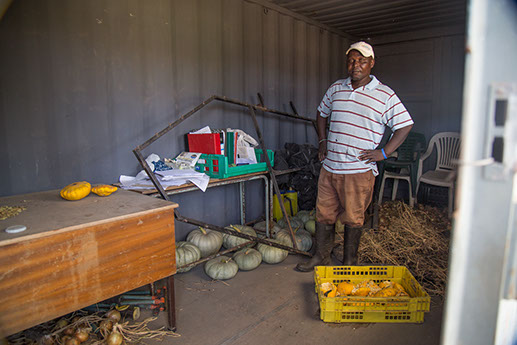
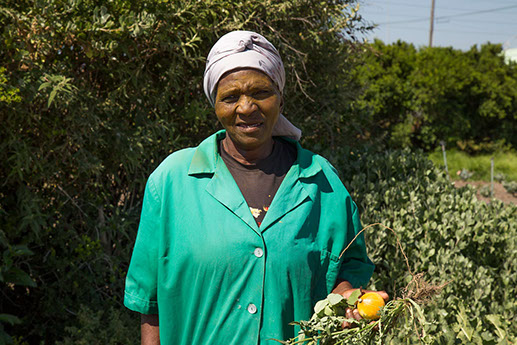
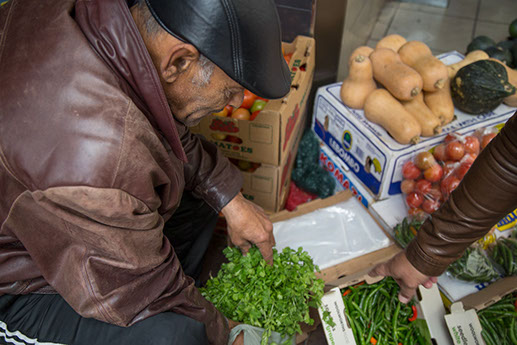
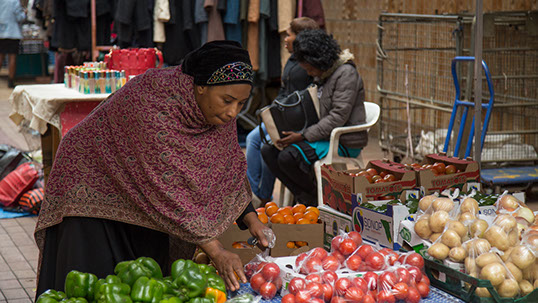
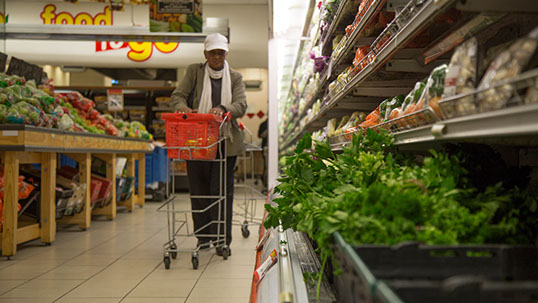
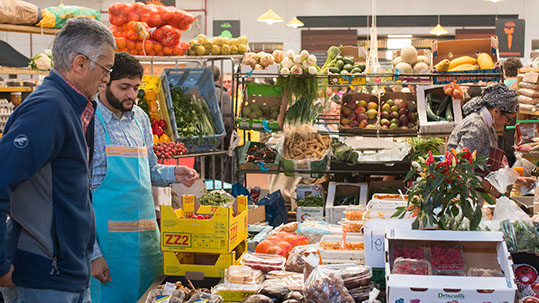
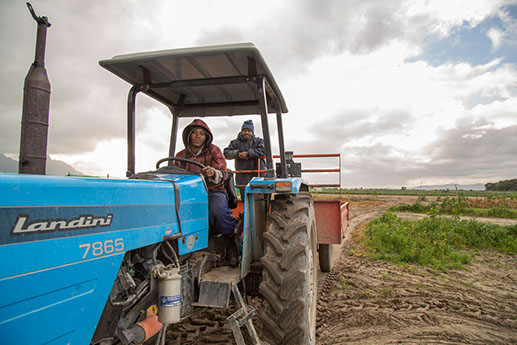
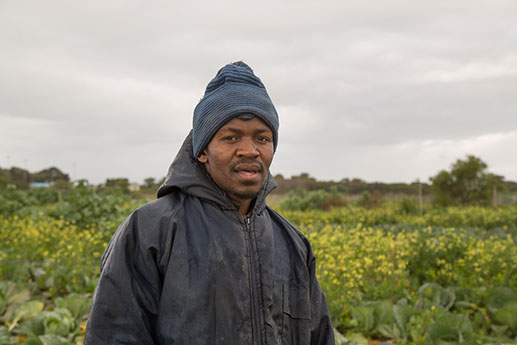
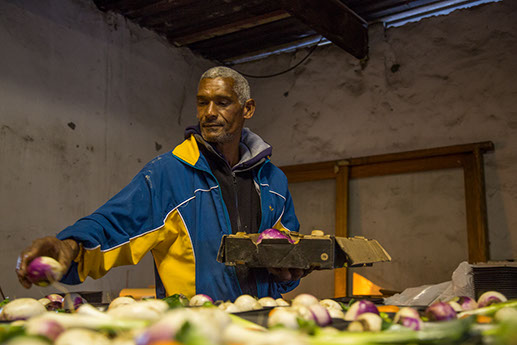
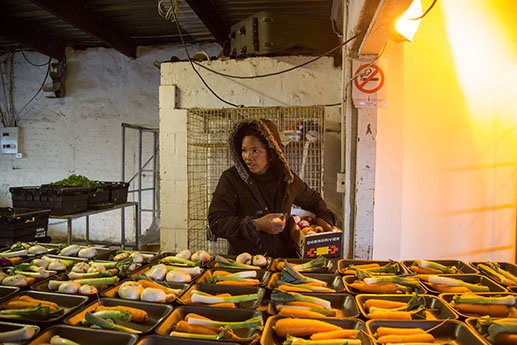
>
Local PHA farmers grow a significant proportion of the food sold at stalls, markets and grocery stores throughout Cape Town. Photos by Sumeya Gasa

The PHA provides much-needed jobs for the agricultural sector. Photo by Sumeya Gasa .

"The Resistance is Fertile" reads a protester's campaign slogan during a protest in Cape Town. Photo by Sumeya Gasa

moratorium on all new public housing at the edges of townships.”) Two, behaviour change, driven by tariff increases as a starting point. (“We have to radically rethink the functioning of the city – what we consider acceptable space and forms of living.”) And third, reforming development legislation. The goal is twofold: facilitating development, but also ensuring there’s no development free-for-all. This is the norm elsewhere in the world, he argues – South Africa no longer has the luxury of allowing developers to profit at the expense of communities.
The problem: in the Western Cape at least, he believes this is likely to be met with resistance. Implementing these changes will require, in short, local leadership, and the country’s largest opposition party, to take on its constituents. “The DA will have to do what it finds politically unviable,” Pieterse says. “With the current disputes within the DA, the fault lines that have been drawn, whether they have the wherewithal to do that is completely unclear.”
In recent months, the City
of Cape Town has indicated
a shift towards more
inclusive planning.
Councillor Brett Herron
has been at the forefront
of this campaign, saying:
“Building inclusive
communities through
reversing the spatial
legacy of apartheid is a
key priority of this government. South African cities should break with the past where our urban form is defined by poorer families living on the fringes.” After lengthy wrangles between the city and housing activists, Herron confirmed the city would begin with affordable housing opportunities on well-located city-owned land.
“The importance of this occasion cannot be overstated. Developing prime land for lower-income residents in Cape Town is a momentous occasion,” Herron said.
Whether the city will follow through beyond the developments it has announced to date remains to be seen. And building, after all, requires water.
For Philippi, the future may depend on how the chips fall within local government. Meanwhile the PHA, with its activists awaiting their court date, remains in limbo, in theory protected by the committee, but in practice still beholden to decisions already taken by the city. Which in turn remains beholden to systems and forces not alive to the rapid changes around them.
And Cape Town’s struggle is located within a much larger context. For Pieterse, the acceleration of climate change at the precise moment African cities are expected to double their urban population represents – in layman’s terms – a particularly worrying time to be alive. Or, as he puts it, a dramatic expansion of dysfunction. “It is the introduction of a profound level of uncertainty none of our modern institutions are geared for,” he explains. “Our nation state was shaped after World War ll, and as large bureaucracies do, has consolidated a sense of self as the only way society can be organised. It is caught in the hubris of that. Taking a long-term institutional perspective, there is just no way we were going to be ready for this.”
Are we going to be ready for more of the same in the years ahead, then? In a word, no. “The big governance transition that will have to happen in the next 10 to 15 years is an acceptance of citizen engagement and analytics. Political scientists and public policy experts don’t know yet what that will look like. We are on the cusp – in the decline of the bureaucratic state and all that represents, and the emergence of something as yet unknown, in the context of heightened crisis, multiple crises. The state is caught in the headlights.” And, Pieterse says, there’s a much greater risk for corruption and irregularities.
The only way out will be to engage better with the public and tap into the vast knowledge available among citizens, he argues; something local leaders have not managed to date, and a failure not unique to them. In Cape Town’s case, the city did, he believes, eventually “throw everything in the sink” to try to solve the water crisis. The trouble is that for myriad reasons, it came too late. And, if rushed development decisions do jeopardise the CFA and local agriculture, the damage will be irreversible.
The only real question, then, during this crucial time, is how desperate citizens’ situation must become before the overhauls begin. It’s a question we can’t yet answer. DM

ieterse argues for three main changes: one, densification. (“The city will have to put a

A farmer in the PHA and his wife point out the areas that will be developed over the green lung in the coming years. Photo by Diana Neille .
South Africa no longer has the luxury of allowing developers to profit at the expense of communities.
By Marelise van der Merwe & Heidi Swart



What happened in Philippi? Why did the city seemingly disregard its own studies and forge ahead to gamble with a critical food and water resource during a disaster-level drought event? Is it a tight-knit network of powerful individuals that stand to benefit? Legislation that’s too easy to find loopholes in? A systemic failure? Or a perfect storm? Regardless, toward Day Zero and beyond, it’s the citizens who will have to adapt and struggle to survive.
We don’t fully know what the New Normal will look like. What we do know is that the population of at least 26 African countries is set to double by 2050. We know the climate – whether naturally or unnaturally – will change. And we know we should expect the unexpected. Which means we’ll need to rethink, drastically, how we manage our cities, our farms, and our resources.
According to a 2017 fact sheet on drought and agriculture in the Western Cape, winter cereal production in 2017 showed decreases of 32% (wheat), 21% (barley) and 4% (canola). The production of stone fruit was estimated to have decreased in one season by 9-20%, while table grape production decreased by 7-13%.
As the Cape lurches towards Day Zero, farmers are facing severe water shortages. Their allocations have run out and they are now dependent on their own water supply for as long as it lasts. Those in the Philippi Horticultural Area say it’s unthinkable to sacrifice any farmland – or potential farmland – that lies over sustainable groundwater. Particularly when many of those farms supply affordable food to local businesses.
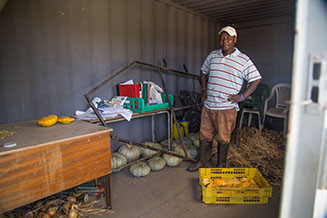
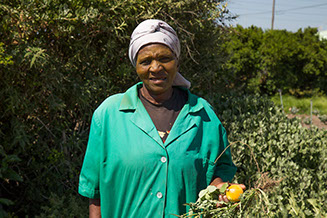
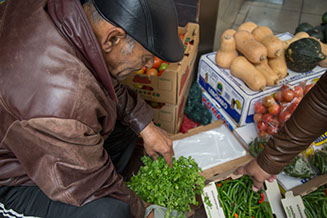
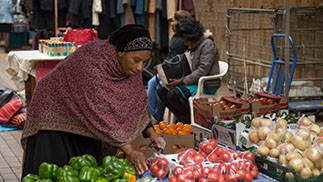
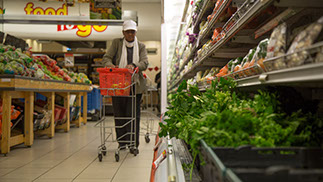
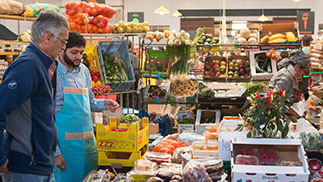
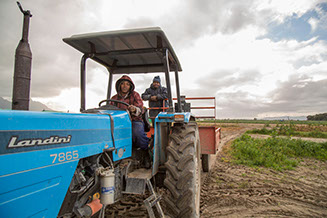
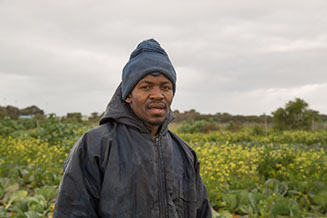
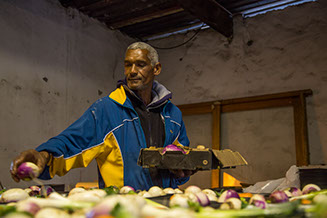
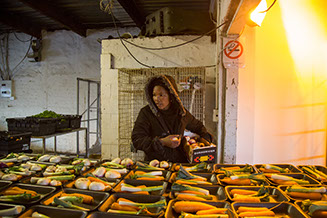
>
Local PHA farmers grow a significant proportion of the food sold at stalls, markets and grocery stores throughout Cape Town.
Photos by Sumeya Gasa.
As to resource allocation, analysts Daily Maverick Chronicle spoke to say inclusivity will become an increasingly important – and difficult – conversation.
Philippi illustrates, on a micro level, Cape Town and South Africa’s failures to keep up with rapid change and expansion in an unpredictable environment, in the aftermath of apartheid. Those failures can take many forms: some unintentional, some willful.
It also illustrates the struggle to balance competing needs in a rapidly developing environment, and the potential for systemic and individual failure where this is not achieved. And it illustrates the challenge of doing so inclusively.
Where does this leave Philippi? According to Professor Edgar Pieterse, director of the African Centre for Cities at the University of Cape Town, it’s a casualty of an outdated system that left room for damage.
A more integrated approach – the kind he’s advocating for service delivery across the board – would have prevented unnecessary suffering. Thinking of Philippi in terms of its overlapping zones would have been helpful: the agricultural zone, Marikana adjacent to it, the industrial zone linking it to the airport. “If you think in terms of a regional plan you will come up with a very different solution,” says Pieterse. “Both absolute protection, and advocating for real estate, are profoundly flawed visions,” he argues. “And in a way, I blame the city – they have not done the planning at the right scale. There is a larger political failure.”

"The Resistance is Fertile" reads a protester's campaign slogan during a protest in Cape Town. Photo by Sumeya Gasa.
This, says head of the Standing Committee on Economic Opportunities, Tourism, and Agriculture in the provincial legislature, Beverley Schafer, is what the committee is hoping to achieve. In August, the committee announced the DA in the Western Cape would push for the development of Philippi into a “dedicated, integrated, and self-sustaining agri-park to capitalise on the immense agricultural and job-creating potential of the region”.
“We have previously called for the Philippi Horticultural Area (PHA) to be classified as an Agricultural Development Zone (ADZ) to protect the long-term farming potential of the land,” she said. “Pursuant to a presentation by the Philippi Economic Development Initiative (PEDI) at the Western Cape Provincial Parliament today, it was revealed that Philippi is earmarked to be a leading agricultural hub in the Province bringing in some R8,1-billion in revenue for the City of Cape Town, and creating 112,000 jobs in the Metro.”
Schafer said at the time that she had written to Mayor Patricia De Lille recommending the city await the results of that aforementioned impact study by Indego into the agricultural footprint and viability of the PHA before any decisions were taken for its future development. Whether Schafer’s recommendation will carry more weight than those of her predecessors remains to be seen – especially given the uncertainty of the City’s own leadership.
Similarly, in response to a question at a recent media briefing, Deputy Mayor Ian Neilson said it was “only a personal opinion because we have not debated this in the City”, but that in light of the scarcity of water, “I do think we need to review our approach… [and protect the PHA].”
Schafer’s researcher, Ryan Smith, told Chronicle: “We want to support the PHA’s future, not only as the breadbasket of the Western Cape, but as a key agricultural contributor to job creation in the province and the agri-processing sector at large.

The PHA provides much-needed jobs for the agricultural sector. Photo by Sumeya Gasa .
“The PHA is a uniquely fertile site and has the potential to serve as a hotspot for agricultural training, skills development, and high-yield intensive agriculture for the Western Cape and South Africa at large. Furthermore, following an NCOP oversight visit yesterday to the Western Cape, the provincial department of agriculture reiterated its commitment to preserving the PHA as the bread basket of the Western Cape. We foresee Philippi’s future squarely in agriculture.”
But, he added, the committee could not reverse decisions already taken by the city. And so, once again, the residents wait.
Water experts, including Morris, have noted that it’s not impossible to recharge an aquifer in developed areas, and that some environmentally sensitive development is not impossible. The PHA Campaign, too, has acknowledged this. The issue, however, is the broader picture: first, not rushing development without adequate assessment and steps to mitigate environmental impact and second, securing the future of agricultural land that, according to a report to the Planning Committee in 2012, is “irreplaceable within 120km of Cape Town”.
Third, according to a report by Umvoto, looking into the best possible use of the area. The report identified the PHA as the highest-potential area for bio-remediation of the Cape Flats Aquifer, if the City of Cape Town were to diversify its water supply and hope to obtain clean water from the CFA. During a one-in-a-thousand-year drought event, this is a point worth noting.
But however local politics evolves, De Lille has been right about one thing: the urgent need for housing is not going away soon. This means the New Normal will involve thinking about integrating human and environmental needs very differently – a complex question in context of potentially declaring the whole of Cape Town a restructuring zone.
This is where the future of inclusivity starts to look a little different. Coleman argues there is little use easing processes for development at the expense of food and water security. The property bubble, she says, will burst if resources dry up. “The current lack of densification incentives means developers are building on increasingly expensive land with narrower margins,” she points out. “Eventually there will be no market for this. PHA-style developments will not sell.”
“We need to start designing and living in our cities in a different way,” says Dr Kirsty Carden, of UCT’s Urban Water Management Research Unit. Where water is concerned, this means multi-functional green infrastructure that allows infiltration of rain; the later extraction of storm water. Ways to build water storage and catchers, and flood alleviation in urban spaces. Most importantly, resilience.

An aerial view of Philippi.
Photo by Christiaan Sterfontein.
Resilience was, in fact, on the city’s radar with the hiring of its first Chief Resilience Officer, Craig Kesson. But the devastating fall-out between him and De Lille saw him turn whistle-blower and the Mayor facing disciplinary processes.
“We don’t know the impact of climate change,” says Carden. “We’re not quite sure in terms of figures and dryness and the types of rain cycles we get. But Cape Town is set to grow over the next 20 years and there are limited options for surface storage. So whether we have another drought or not, we will have shortages of water over the next 20 years.”
That’s just water. In reality, says Pieterse, water insecurity is just one symptom of a system in its death throes, and a complete overhaul is required. This will start with legislation. And after legislation, political will. Implementation is the real challenge.
The Spatial Development Framework, he points out, has long recognised the need to reform planning guidelines across Cape Town. Political will is something different. “The burning platform just wasn’t there,” he told Daily Maverick Chronicle. “The current crisis represents for the first time a profound enough set of challenges that doesn’t represent any easy policy or technical answers – it just doesn’t exist. It requires more profound consideration.” In other words, the water shortage, alongside increasing public pressure for well-located social housing, may be a very necessary wake-up call. The question is whether it’s too late.

to put a moratorium on all new public housing at the edges of townships.”) Two, behaviour change, driven by tariff increases as a starting point. (“We have to radically rethink the functioning of the city – what we consider acceptable space and forms of living.”) And third, reforming development legislation. The goal is twofold: facilitating development, but also ensuring there’s no development free-for-all. This is the norm elsewhere in the world, he argues – South Africa no longer has the luxury of allowing developers to profit at the expense of communities.
The problem: in the Western Cape at least, he believes this is likely to be met with resistance. Implementing these changes will require, in short, local leadership, and the country’s largest opposition party, to take on its constituents. “The DA will have to do what it finds politically unviable,” Pieterse says. “With the current disputes within the DA, the fault lines that have been drawn, whether they have the wherewithal to do that is completely unclear.”
In recent months, the City of Cape Town has indicated a shift towards more inclusive planning. Councillor Brett Herron has been at the forefront of this campaign, saying: “Building inclusive communities through reversing the spatial legacy of apartheid is a key priority of this
government. South African cities should break with the past where our urban form is defined by poorer families living on the fringes.” After lengthy wrangles between the city and housing activists, Herron confirmed the city would begin with affordable housing opportunities on well-located city-owned land.
“The importance of this occasion cannot be overstated. Developing prime land for lower-income residents in Cape Town is a momentous occasion,” Herron said.
Whether the city will follow through beyond the developments it has announced to date remains to be seen. And building, after all, requires water.
For Philippi, the
future may depend
on how the chips
fall within local
government.
Meanwhile the
PHA, with its
activists awaiting
their court date,
remains in limbo,
in theory protected
by the committee,
but in practice still
beholden to decisions already taken by the city. Which in turn remains beholden to systems and forces not alive to the rapid changes around them.
And Cape Town’s struggle is located within a much larger context. For Pieterse, the acceleration of climate change at the precise moment African cities are expected to double their urban population represents – in layman’s terms – a particularly worrying time to be alive. Or, as he puts it, a dramatic expansion of dysfunction. “It is the introduction of a profound level of uncertainty none of our modern institutions are geared for,” he explains. “Our nation state was shaped after World War ll, and as large bureaucracies do, has consolidated a sense of self as the only way society can be organised. It is caught in the hubris of that. Taking a long-term institutional perspective, there is just no way we were going to be ready for this.”
Are we going to be ready for more of the same in the years ahead, then? In a word, no. “The big governance transition that will have to happen in the next 10 to 15 years is an acceptance of citizen engagement and analytics. Political scientists and public policy experts don’t know yet what that will look like. We are on the cusp – in the decline of the bureaucratic state and all that represents, and the emergence of something as yet unknown, in the context of heightened crisis, multiple crises. The state is caught in the headlights.” And, Pieterse says, there’s a much greater risk for corruption and irregularities.
The only way out will be to engage better with the public and tap into the vast knowledge available among citizens, he argues; something local leaders have not managed to date, and a failure not unique to them. In Cape Town’s case, the city did, he believes, eventually “throw everything in the sink” to try to solve the water crisis. The trouble is that for myriad reasons, it came too late. And, if rushed development decisions do jeopardise the CFA and local agriculture, the damage will be irreversible.
The only real question, then, during this crucial time, is how desperate citizens’ situation must become before the overhauls begin. It’s a question we can’t yet answer. DM

ieterse argues for three main changes: one, densification. (“The city will have

A farmer in the PHA and his wife point out the areas that will be developed over the green lung in the coming years. Photo by Diana Neille.
South Africa no longer has the luxury of allowing developers to profit at the expense of communities
By Marelise van der Merwe
& Heidi Swart